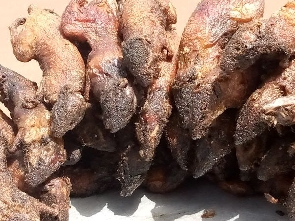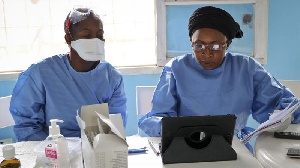Traders in bushmeat and hunters have launched the National Bushmeat Association of Ghana to effectively regulate their business activities.
It is also to promote the sustainability of the bushmeat industry to benefit key actors in the industry and ensure biodiversity conservation.
Bushmeat is meat from wildlife species hunted for human consumption and sold in notable markets such as Atwemonom in Kumasi, Takoradi Market, Techiman, and the Kantamanto markets.
It is a primary source of fresh animal protein and income for hunters and traders.
In Ghana, the types of bushmeat hunted include monkeys, bats, grasscutter, antelope, and giant rats.
Madam Comfort Badu, the Queenmother of the Atwemonom Bushmeat Traders Association and President of the National Association, said the executive would educate hunters on best practices to prevent the use of “dubious means” to hunt.
“Some hunters use carbide to hunt in the wild; getting those people in the Association will prevent them from engaging in such practices. The health of the citizenry is essential,” she stated.
Madam Badu said the Association would ensure that the bushmeat industry could continue to exist to benefit stakeholders as well as ensure the safety of consumers and animals in the wild.
The Association was also to foster unity, facilitate skills development for members, regulate prices and avoid hoarding of meat, help to promote food safety, and facilitate conservation of wildlife.
The President recommended bushmeat to diabetic and hypertensive patients, explaining that the animals chewed grass, so their meat was healthy for humans.
Mrs Monica Quansah, the President of the Kantamanto Bushmeat Traders Association, said bushfires displaced animals in the wild, leading to the extinction of various species.
That affected their businesses since there would be a lack of game for sale, she said.
Dr Kofi Amponsah-Mensah, Director of Research at the Centre for Biodiversity Conservation Research, University of Ghana, said it was important to have sustainable and equitable solutions to balance human activities with biodiversity conservation to ensure sustainable livelihoods.
He said the Centre was establishing an alternative livelihood fund to support bushmeat traders and hunters by providing them with financial security for other income-generating activities in case their businesses declined.
“These traders, even though they do not take undertones to the species that they trade in, do not receive any support. There isn’t any health monitoring support that came during COVID-19; these women were left out,” he said.
“So, it’s almost like when these instances hit, their businesses almost collapsed and people basically went to ground zero, losing all their finances.”
“One of the things we are trying to do, or we’ve tried to set up, is a livelihood support fund that would encourage people to go into alternative livelihoods so that, in case such instances happen, there’s something that they can fall back on.”
Dr Amponsah-Mensah, who launched the Association at the Centre for Biodiversity Conservation Research, Legon, urged the traders and hunters to adopt safe and hygienic practices to protect themselves and their customers.
Mr Patrick Essumang, the Secretary of the Association, encouraged the media to reach out to members for factual information about the business to avoid misinforming the public about bushmeat.
The elected Executives are Madam Comfort Badu, President; Mr Yaw Fosu, Vice President; Mr Patrick Essumang, Secretary; Mrs Monica Quansah, Organising Secretary; Mr Ishmael Asibi, Assistant Organising Secretary; and Grace Tiwaah, Treasurer.
Regional News of Sunday, 6 April 2025
Source: GNA













